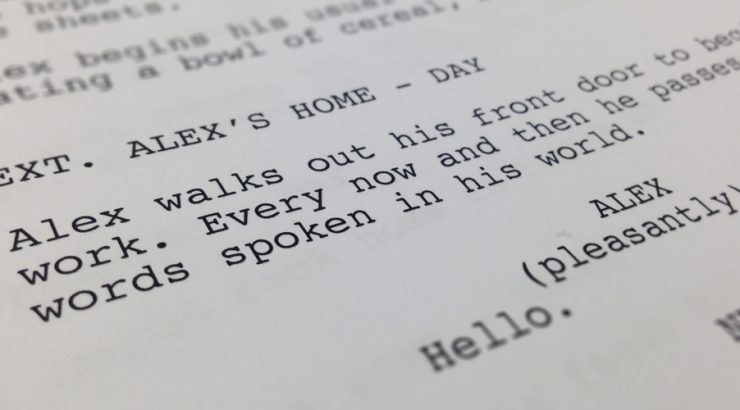
Screenwriting: Where The Story Begins
March 9, 2017
Before the budget is set, the cameras roll, and the film is edited, there is something very integral to the process that is needed: the script. Too often people forget that these worlds we see on the silver screen need to come from somewhere.
“Screenwriters are invisible, and most people don’t know that we exist,” said professor James Dutcher. He’s right about screenwriters being the unseen force behind films. Without them, your favorite movies wouldn’t even have been made.
To begin with, what actually is screenwriting? It seems like a simple question, but in reality, it’s a little more complex than that. To craft a screenplay, you not only have to write the dialogue that is said, but also set the scene, find the heart of the story, provide direction, and often, manipulate the viewer’s emotion.
George Melies’ 1902 film A Trip to the Moon is believed to be the first screenplay. While movie itself is silent, the screenplay does contain action lines and specific descriptions that look like a modern-day script.
Over the years, films became longer and more complex, so the need for a good screenplay became more prominent in the industry. The construction of movie theaters nationwide also impacted the development of screenplays, because as audiences became more sophisticated and widespread, the stories had to be as well.
In 1927, when the first “talkie” was released, screenwriting quickly became an important position to have in Hollywood. The 1930s brought on the studio system, and only heightened the importance of having someone write. Having a “blueprint” of a film, or even a continuity script, was a must have before the cameras even rolled.
Around 1970, the “spec script” was first created, and changed the industry for writers forever. These were written on speculation of sale, and often used to lobby for jobs.

Barry Blaustein
But with some many people writing these days, what makes a good screenplay?
“A good script has to be compelling, it has to make me lean forward,” said professor Barry Blaustein. “It has to make me wonder what is going to happen to this character; are they going to achieve their goal? Are they going to learn something? Every page, every scene, should make you want to go on this journey with this character.”
Barry Blaustein is an esteemed writer in his own right. Barry wrote for Saturday Night Live for years, and went on to write such films as the 1988 Eddie Murphy classic Coming to America, The Nutty Professor, and Beyond the Mat, the fantastic documentary about professional wrestlers. Ironically enough, Barry’s first big screen assignment was also Mahoney’s, in Police Academy 2: Their First Assignment. But for someone who is known for writing some amazing comedies, Barry also knows how to craft a good screenplay.
“It has to be about something, something about the human condition,” Blaustein said. “It doesn’t have to be heavy, it doesn’t have to be comedic, but it has to be about something. If the movie is good, I’m thinking about it the next day.”
Barry feels like, in order for a script to succeed, it needs to have characters that are compelling.
“What makes a character believable to me is I have some sort of human, emotional connection to them. I can recognize their emotions, whatever it is, because I’ve felt it before. It helps if I recognize them, that I’ve seen these types of characters in my life before,” said Blaustein.
He explained that they don’t even have to be sympathetic, provided they are compelling. He used the example of The Godfather, where the titular character is not a sympathetic person at all, but he is compelling, and that makes people interested in him.
But in addition to realistic characters, you also need a good story. But these two often go hand in hand, as James Dutcher tells me.
“A good script has a good story, and it makes me care about what is going to happen to the people in the story,” said Dutcher. “There are lots of ways to achieve that, but it is needed for a good script.”
The expressing of some sort of emotion, though, is important. I asked Barry why he likes writing for comedy, and his answering was a little surprising in how heartfelt it was.
“I’m drawn to comedy because it is a way of expressing emotion. Cynics are really romantics who are tired of being proven wrong. It’s just the way my mind works, but for comedy to work, there has to be a reality in it,” Blaustein said.
The actual written language of the screenplay, however, can make or break a script. There is a difference between good writing, and a good screenplay.
“If the text flows on the page as it will on the screen, then it’s probably good,” said Dutcher. “But if write these baroque action lines and have these flowing descriptions, it may mean you’re a good writer, but it doesn’t make for a good script.”
There are millions of people writing their stories and trying to make it in this business. Screenwriting isn’t easy, but Barry has some good advice for those trying to break in.
“You’re going to get knocked down,” said Blaustein. “But you have to keep coming back. If you get knocked down seven times, then you have to get up eight times.”
And while it is good to have an idea you are passionate about, he knows that being open to other ideas is a good thing.

James Dutcher
“Listen to other people,” said Blaustein. “A big mistake I see is someone pushing the same idea, over and over again. That’s great, you can probably do that someday, sure, but what else do you got? You can come back to that idea.”
There has to be a balance in the writing to make it work on the screen.
“I think people think with screenwriting that God is dictating, but you’re just making these things up,” said Dutcher. “When you’re writing, you may be amusing the hell out of yourself, but you have to think ‘is it just me? Or will others like this too?’ as you go through the process.”
At the end of the day, though, having the audience connect with the story and the characters on the screen is what matters.
“Really, I just have to care about the people on the screen,” said Dutcher.
In addition to Dutcher and Blaustein, we have many esteemed members of our screenwriting faculty here at Dodge College who have worked in the business for many years, and continue to write for the silver screen. Having members of our faculty who are currently working in the industry helps our students learn what the current trends of today are, and helps them shape their stories into what Hollywood is looking for.
Dodge College has also partnered up with The Black List, where every year we highlight our ten best scripts to their members. We are only one of four schools in America that does this, and last year, one of our student’s scripts was optioned.
We know that screenwriting is often overlooked in the filmmaking process, but at Dodge College, we feel it is important to highlight all aspects of making entertainment. Because like Blaustein said, without a good story…we wouldn’t have anything else.
Find out more about the art of crafting a script in the latest Dodge Cast!
EDITOR’S NOTE: Be sure to visit James Dutcher’s website at whenthepagewasblank.com for some great quotes and interviews with screenwriters.

